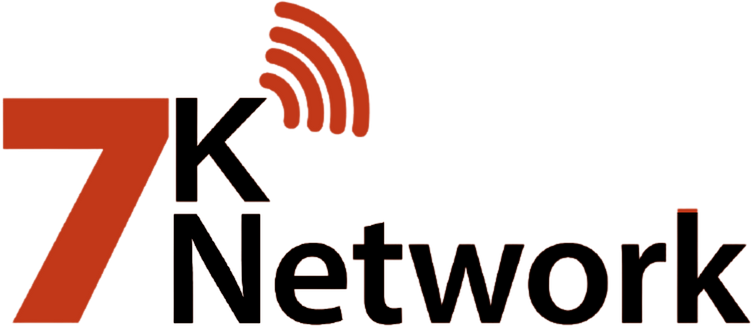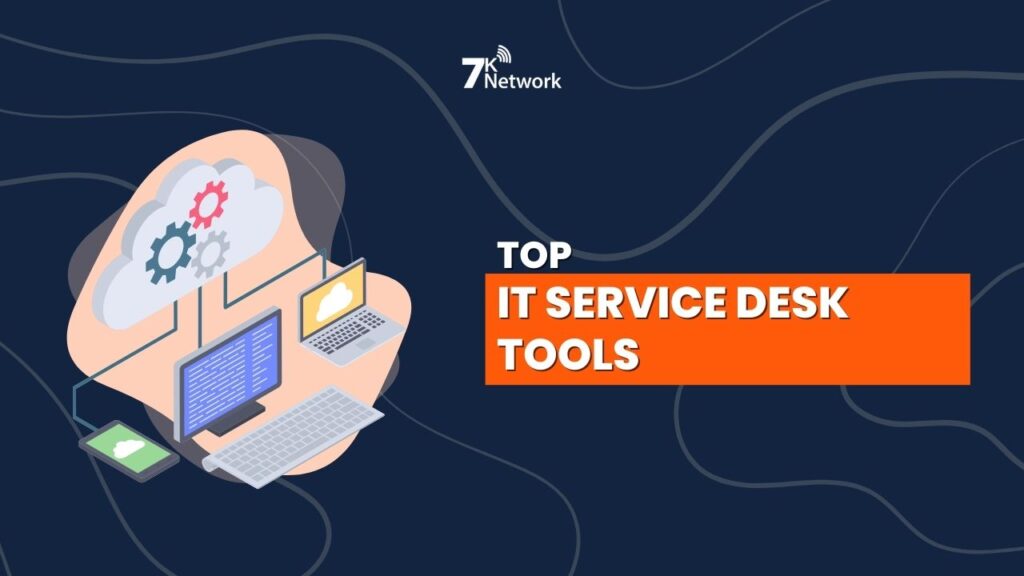Successful IT request management is key to keeping businesses running, and that is where IT service desk tools come in. They facilitate smooth issue tracking, ticket resolution, asset tracking, and IT staff communication with the rest of the organization. Regardless of whether your role is that of a developer, designer, marketer, IT support specialist, or system administrator, an appropriate service desk tool will enhance productivity, reduce incident response time, and overall increase user satisfaction.
In the following list of the top 14 IT service desk tools, we have taken into account important factors like ease of use, automated features, integration, reporting and analytics, scalability, and customer support. We aim to aid teams, be they technical or not, select an instrument that aligns with their specific needs of workflow and the size of the organization.
Importance of Best IT Service Desk Tools
The ideal IT service desk tools are critical component of business productivity, end-user satisfaction, and IT productivity in general. They enable automated request and incident workflow management, leading to faster resolution of issues and productivity. Through such basic capabilities as self-service portals and real-time notifications, the software enhances user experience and also the workload for the IT department. They also enable communication, so collaboration and troubleshooting can occur in real-time. And with analytics and reporting mixed in, companies can view performance trends and issues that are emerging, to make informed decisions.
Additionally, high-end service desk software is scalable and flexible, so companies can grow without sacrificing on service levels. Finally, rich security features and regulation compliance capability within such tool sets guarantee businesses fulfill regulations as well as keep sensitive information safe. Indeed, effective IT service desk tools investment is one of the key driving forces in ensuring efficacious, safe, and reliable IT service provision.
Criteria for Selection of Best IT Service Desk Tools
Below are the key selection factors for the best IT service desk tools that can be utilized successfully:
- Ease of Use: The software should have agent- and end-user-friendly interfaces with little training and the capability to learn within a short duration by teams.
- Ticket Management Efficiency: The software should be able to deliver efficient functionality for ticket creation, categorization, assignment, prioritization, and closure ideally with automated functionalities.
- Workflow and Automation Capabilities: Top-notch solutions provide automated ticket distribution, SLA administration, response templates, and rule-based workflow to reduce human touch and automate functions.
- Integration Capabilities: A good service desk is integrated properly with other solutions, email, chat implementations, monitoring solutions, CRM solutions, and project management solutions.
- Scalability & Customization: It must be scalable to organization size and must provide form, workflow, and role customization per defined business requirement.
- Reporting & Analytics: Ad-hoc reporting as well as dashboards are embedded so that it is possible to monitor key KPIs such as ticketing volume, time-to-resolution, agent performance, and SLA satisfaction.
- Knowledge Base Support: There should be inbuilt knowledge bases within strong platforms that are present in their self-service portals, which can be searched by end-users, FAQs, and documents that can divert tickets away from agents and aid users.
- Security & Compliance: Protection of data, access control, and compliance standards such as SOC 2, ISO/IEC 27001, or GDPR must be enforced by the platform.
- Multi-Channel Support: Channels such as email, web, chat, phone, or mobile applications must be supported so that the customers can input and manage tickets so that convenience and flexibility are obtained.
- Customer Support & Community: Suppliers need to offer timely support, detailed documentation, and user communities to make onboarding, troubleshooting, and best practices easy.
These standards guarantee that the tools selected are appropriate to the diverse operating, technical, and strategic requirements of IT organizations across various industries and organization sizes.
List of 15 Best IT Service Desk Tools
1. Freshservice
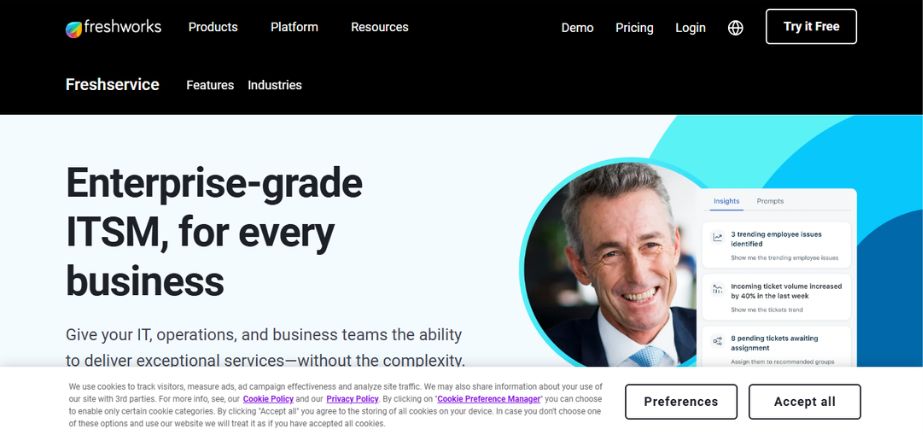
Freshservice by Freshworks is one of the cloud-based IT service desk tools that is reputed to have a newer, easier-to-use interface and robust automation features. It automates functions via incident, problem, change, and asset management. Its AI-driven ticketing and workflow automation system minimizes manual labor, enhancing productivity among IT staff. The software integrates with leading collaboration platforms seamlessly so that communication is simple. Freshservice has a comprehensive knowledge base along with complete ITIL. It has self-service with enhanced user satisfaction. Freshservice is scalable and a safe bet for enterprises who wish to automate their IT support systems.
Key Features:
- AI-powered ticketing
- Asset and incident management
- SLA management
- Workflow automation
Pros:
- Intuitive user interface
- Fast setup and onboarding
Cons:
- Limited advanced reporting
- May lack depth for large enterprises
Pricing:
Starts at ₹1399/agent /month
Who Should Use It?
Small to mid-size teams needing an easy-to-use ITSM platform.
2. ServiceNow
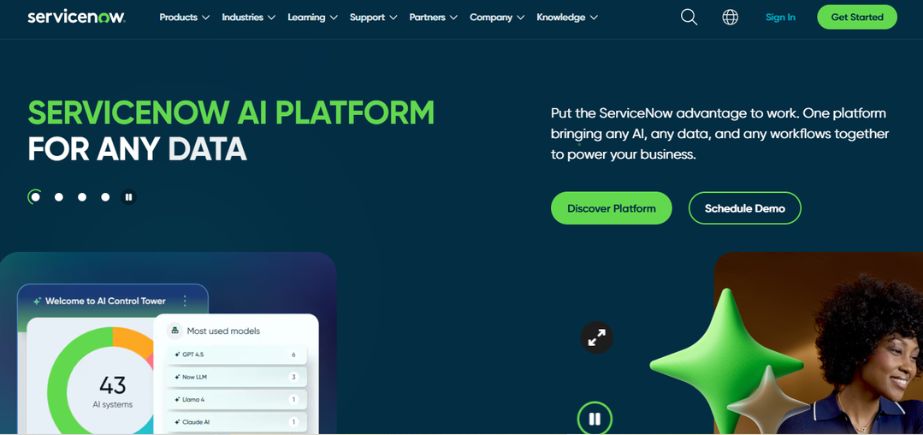
ServiceNow is a full-fledged enterprise ITSM solution that delivers a wide range of tools to automate IT services and enhance departmental service delivery. Based on its powerful workflow engine and augmented with AI and machine learning capabilities, ServiceNow empowers organizations to manage incidents, changes, and assets better. Through support for deep integration and flexible architecture, ServiceNow can be tailored according to various business needs. It enables IT operations at scale, promotes cross-team collaboration, and offers a single service experience for IT, HR, and customer service operations. Ideal for digital transformation organizations.
Key Features:
- AI and machine learning support
- CMDB and change management
- Multi-department workflows
- Integration with major enterprise tools
Pros:
- Highly scalable
- Enterprise-focused features
Cons:
- Expensive
- Steep learning curve
Pricing:
Custom quote required
Who Should Use It?
Large organizations with complex IT requirements.
3. Zendesk
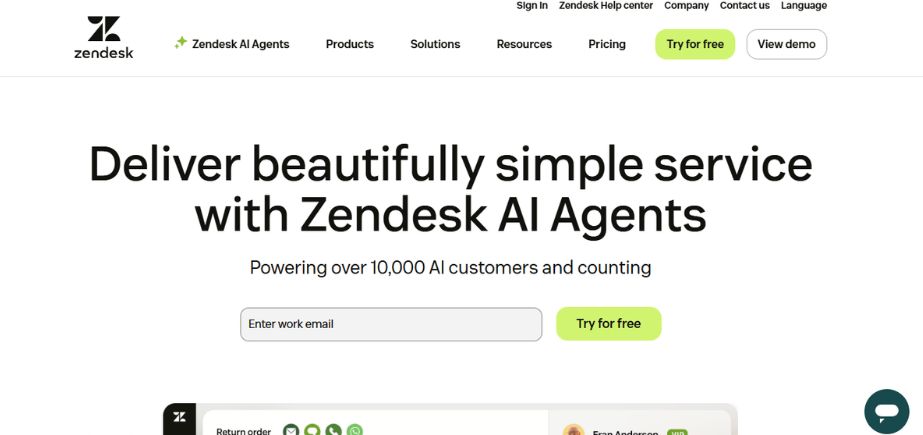
Zendesk is also a customer service solution that comes with IT service desk functionality and ITIL-ready features. It also includes omnichannel ticket management, phone, email, chat, and social media, to enable teams to respond to incidents anywhere. Zendesk provides easy-to-use interfaces, automation rules, SLA tracking, and a powerful analytics dashboard. It also includes a self-service portal and knowledge base for quicker resolution of issues. Through its robust app marketplace and integration platform, Zendesk enables IT organizations to automate support processes without compromising high service quality levels
Key Features:
- Ticketing with SLA policies
- Multichannel support
- Self-service portal
- Automation and macros
Pros:
- Easy to use
- Seamless integrations
Cons:
- Cost can add up with add-ons
- Limited asset management features
Pricing:
Starts at $19/agent/month
Who Should Use It?
SMBs needing a user-friendly service platform.
4. Workwize
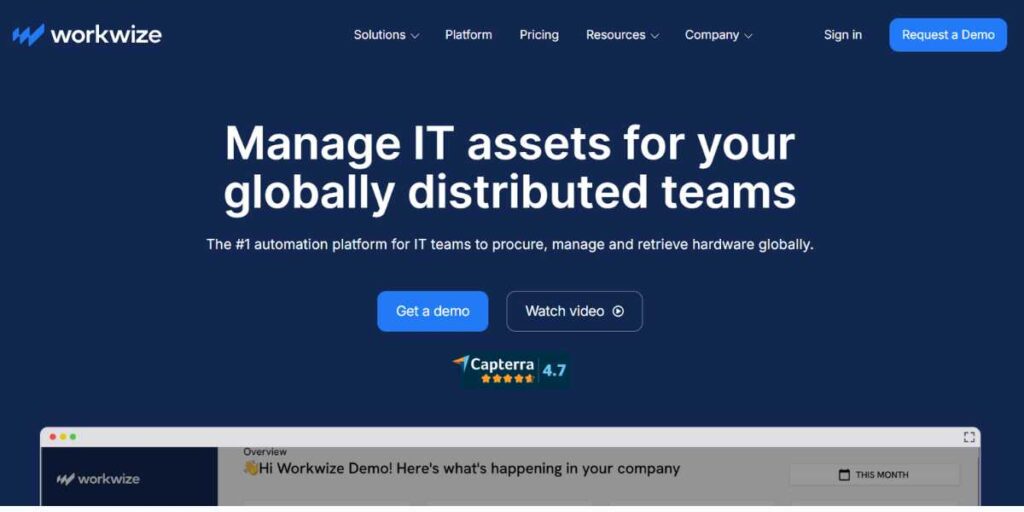
Workwize is a global IT hardware lifecycle management platform that helps enterprises procure, deploy, track, and retire IT devices with complete automation. Designed for distributed and remote teams, it streamlines onboarding and offboarding by enabling employees to select and receive pre-configured devices via a self-service portal, while IT teams can easily retrieve, refurbish, and recycle hardware securely. With integrations into HRIS, MDM solutions, and collaboration platforms, Workwize reduces manual workload and ensures full compliance across 100+ countries. Its AI-powered automation layer (Workwize MCP) further simplifies asset workflows, enabling no-code automations through tools like Zapier and Claude. Workwize also emphasizes sustainability by extending device lifecycles and reducing e-waste through refurbishment and resale programs.
Key Features:
- Global IT hardware procurement and deployment
- Automated onboarding and offboarding workflows
- Real-time asset tracking and inventory management
- Seamless integrations with HRIS, MDM, and collaboration tools
- AI-driven automation via Workwize MCP
- Certified recycling, resale, and eco-friendly disposal
Pros:
- Covers full hardware lifecycle end-to-end
- Scales across 100+ countries with local warehousing
- Strong focus on sustainability and cost savings
Cons:
- Best suited for companies with 150+ employees
- Not an ITSM ticketing system (works alongside one)
Pricing:
Custom pricing based on company size and global requirements
Who Should Use It?
Enterprises and fast-growing companies with distributed or remote teams that need scalable, automated IT hardware lifecycle management.
5. Jira Service Management

Atlassian Jira Service Management is a full-cloud ITSM solution for agile and DevOps teams. The solution allows IT teams to resolve incidents, change, and service requests in real time, with the support of insights and teamwork through seamless connection with Confluence and Jira Software. It has flexible workflows, automated rules, asset management, and SLA. The developers, operations, and support teams can communicate better and sort things out faster. Jira Service Management comes in especially handy in high-velocity environments that have to respond around the clock and stay forever innovating.
Key Features:
- Integration with Jira Software
- SLA tracking
- Custom queues and workflows
- Knowledge base integration
Pros:
- Great for dev teams
- Deep Atlassian ecosystem
Cons:
- Can be complex to configure
- Lacks native asset management
Pricing:
Starts at $21/agent/month
Who Should Use It?
Agile teams and software companies.
6. ManageEngine ServiceDesk Plus
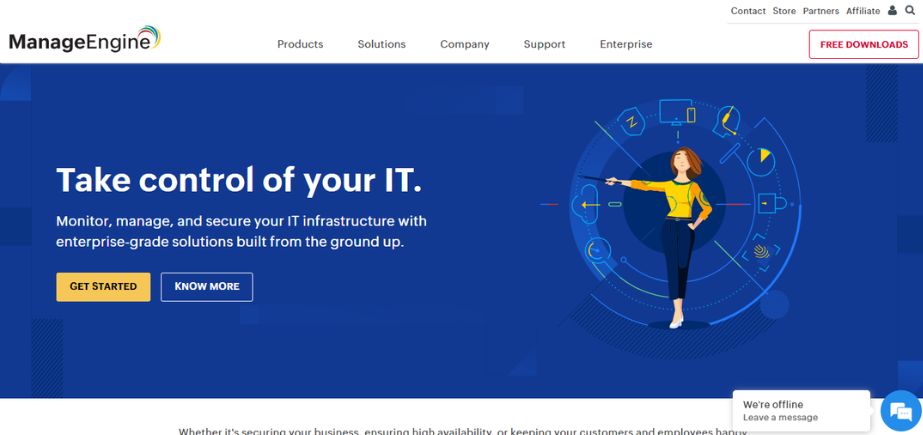
ManageEngine ServiceDesk Plus is a web-based IT service desk application with incident, problem, change, and asset management modules. It accommodates ITIL practices and includes a visual CMDB, contract and purchase management, and a self-service portal. ManageEngine ServiceDesk Plus also comes on the cloud and on-premise and offers an economical yet robust ITSM experience. With its automated reporting and inherent automation, it helps IT organizations improve operational efficiency and monitor service performance. It is a trusted solution for businesses that desire high functionality without the complexity of advanced installation.
Key Features:
- Incident, problem, and change management
- Asset management
- Custom reports and dashboards
- Mobile app
Pros:
- Affordable for SMBs
- Highly customizable
Cons:
- Dated UI
- Setup can be lengthy
Pricing:
Starts at $10/technician/month
Who Should Use It?
IT teams looking for low-cost, full-featured ITSM.
Suggested Blogs:
- Best ORM Tools
- Best Jira tracking Software
- Best Free Augmented Reality Software
- Best Infrastructure Monitoring Tools
- Best Healthcare CRM for Patient Management
7. SysAid
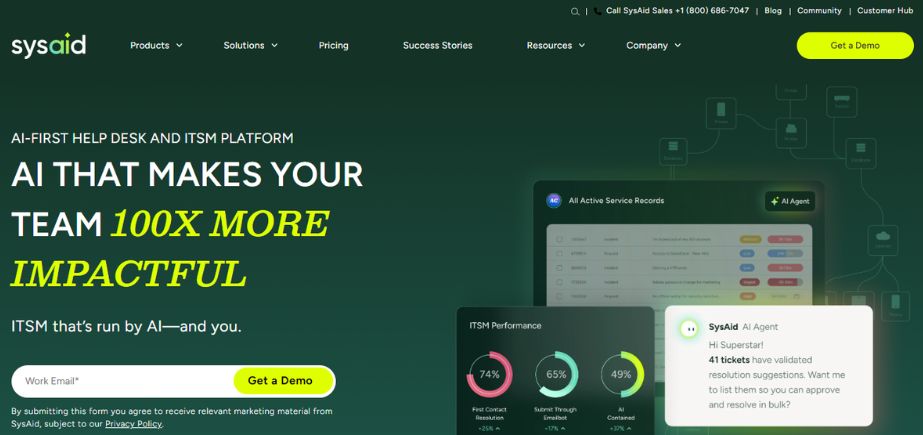
SysAid is a comprehensive ITSM solution that integrates help desk and asset management capabilities with intelligent automation. It includes modules for ticketing, incident management, change management, and an end-user self-service portal. SysAid also includes remote control, automated workflow creation, and extensive reporting features.
It can be deployed on-premises or in the cloud, providing organizations of all sizes with flexibility. With its drag-and-drop feature and dashboard customization, SysAid simplifies IT service delivery and enhances the end-user experience. It is widely adopted across industries because it is scalable and highly automated.
Key Features:
- Self-service portal
- Workflow automation
- Remote control support
- Knowledge base
Pros:
- Quick implementation
- Good automation features
Cons:
- Some UI inconsistencies
- Limited third-party integrations
Pricing:
Custom pricing
Who Should Use It?
SMBs with moderate IT support needs.
8. BMC Helix ITSM
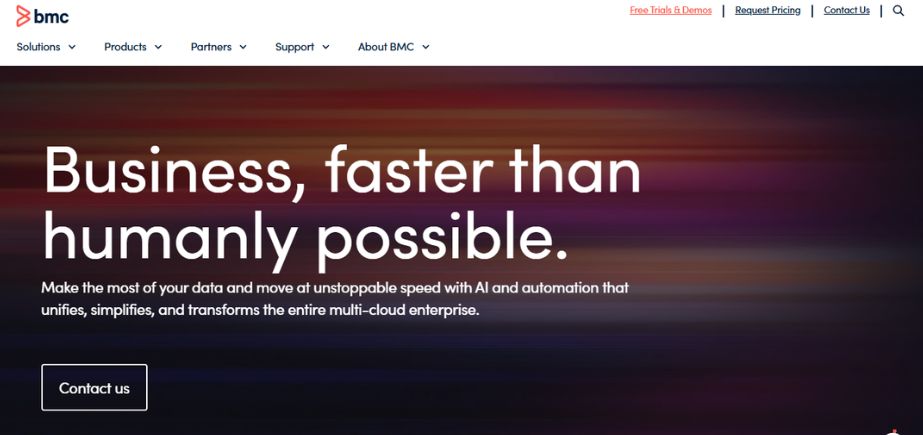
BMC Helix ITSM is IT service management software for enterprises that utilize AI, machine learning, and automation to enhance service efficiency and decision-making. It has stronger incident, problem, change, and knowledge management capabilities and a richer chatbot experience for user interaction. BMC Helix is suited for large-scale deployment and easily integrates with other IT operations software, giving IT service management one platform. Its user-centric, state-of-the-art design enables broader adoption by users, and its scalable back end enables high availability and mass enterprise deployment.
Key Features:
- Predictive service management
- Multi-cloud support
- Cognitive automation
- DevOps integration
Pros:
- AI-powered insights
- Suitable for large enterprises
Cons:
- Complex to configure
- Premium pricing
Pricing:
Custom quote
Who Should Use It?
Enterprises looking for AI-led ITSM transformation.
9. Spiceworks Help Desk
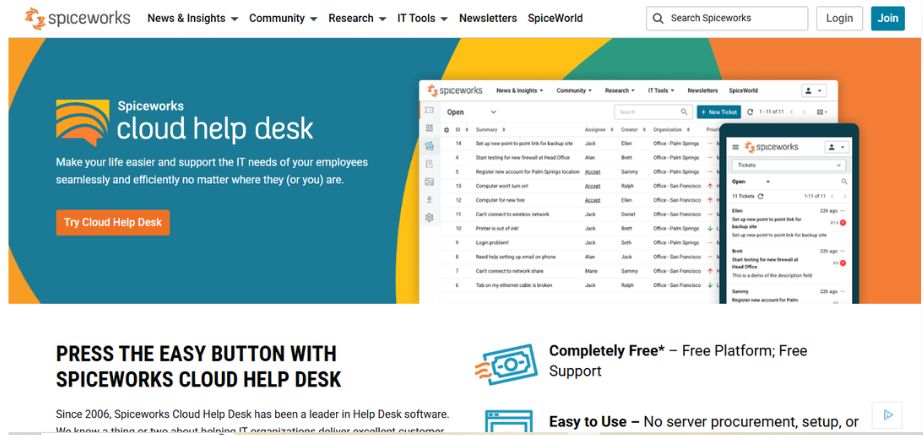
Spiceworks Help Desk is a no-cost IT support software for IT teams to help them handle tickets, monitor issues, and keep end-users satisfied. Though free of charge, it comes with solid features including creating tickets via email, automated responses, and personalized ticket views. Spiceworks also provides built-in network inventory software and report options, enabling teams to quickly diagnose problems. The web-based interface is simple to implement and use, and it enjoys an active community forum. Spiceworks is ideal for small to mid-sized teams who need straightforward, free IT support management.
Key Features:
- Ticket management
- Email integration
- Mobile access
- Active IT community
Pros:
- Completely free
- Lightweight and fast
Cons:
- Limited features
- Lacks automation
Pricing:
Free
Who Should Use It?
Startups and small IT teams on a budget.
10. SolarWinds Service Desk
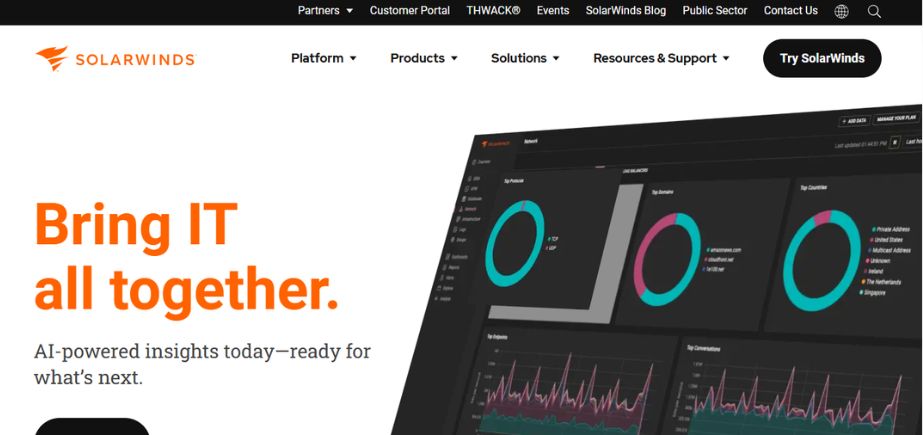
SolarWinds Service Desk is a cloud-based ITSM solution that aims to simplify IT support through automation and data-driven information. It features incident, problem, change, and asset management along with built-in risk and contract management. It features a complete set of reporting tools and AI-driven ticket resolution suggestions. Some of the features that are beneficial to the users include an intuitive dashboard, customizable workflows, and self-service. SolarWinds provides quicker delivery of services and greater visibility into IT operations. It allows IT professionals to minimize downtime and manage performance metrics effectively through automated and centralized support operations.
Key Features:
- Incident and asset management
- AI recommendations
- Change management
- Service catalog
Pros:
- User-friendly
- Built-in AI features
Cons:
- Pricing may be high for small teams
- Limited integrations
Pricing:
Starts at $19/agent/month
Who Should Use It?
Midsize businesses needing a smart help desk.
11. Ivanti Neurons for ITSM
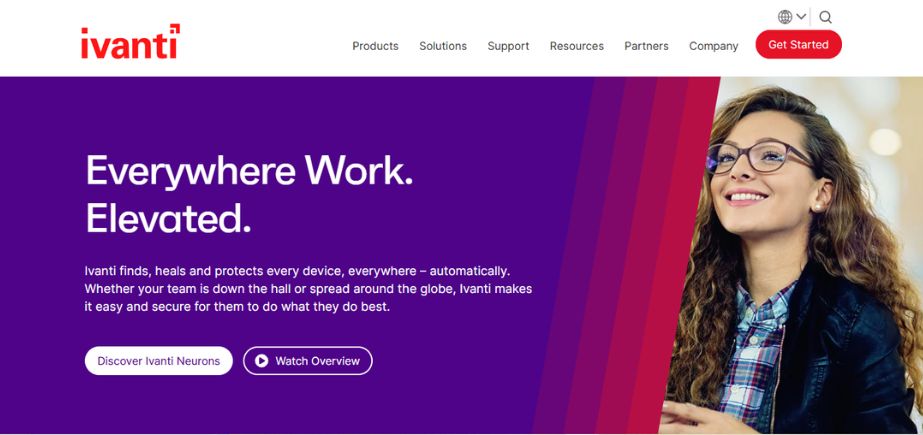
Ivanti Neurons for ITSM is an enterprise-level service management solution that offers advanced automation, AI-powered insights, and real-time monitoring of services. The solution offers strong support for a wide range of ITIL processes including incident, change, asset, and knowledge management. Ivanti AI bots resolve issues automatically, freeing up IT teams’ workload. It is designed to integrate well with third-party solutions and offer low-code workflow customization. The platform enables organizations that are looking to revolutionize IT operations, enhance service quality, and drive digital transformation through more informed, data-driven choices and prescient service support.
Key Features:
- Real-time diagnostics
- Automated ticket resolution
- Service mapping
- Mobile access
Pros:
- Predictive analytics
- Scalable architecture
Cons:
- High learning curve
- Premium pricing
Pricing:
Custom quote
Who Should Use It?
Enterprise IT teams seeking advanced automation.
12. TOPdesk
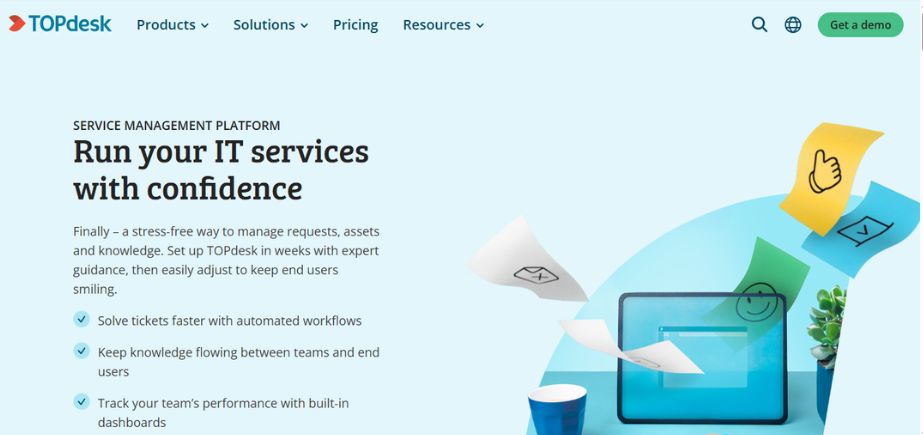
TOPdesk is a user-friendly ITSM software that can handle HR, facilities, and IT service management. TOPdesk offers modules for asset, change, and incident management and also a knowledge base and self-service portal to facilitate end-users. The layout of TOPdesk is clean and simple and can make it easy for teams to work on tickets, requests, and workflows. TOPdesk promotes cooperation between departments and provides user-configurable dashboards for live reporting. It is modular and allows organizations to expand as needed with high-class internal support and effective service operation across multiple teams.
Key Features:
- Incident and change management
- Workflow automation
- Knowledge base
- Self-service portal
Pros:
- Clean UI
- Modular system
Cons:
- Limited reporting tools
- Not ideal for large enterprises
Pricing:
Custom pricing
Who Should Use It?
Educational institutions, SMEs, and government bodies.
13. HaloITSM

HaloITSM is a complete IT service management solution that includes incident, problem, change, and asset modules. HaloITSM is built on best practices of ITIL and offers an end-user- and agent-friendly interface. The solution offers automation, enterprise reporting, SLA management, and a service catalog. Owing to configurable workflows and seamless integration with industry-standard third-party tools, HaloITSM offers organizations the ability to map their IT processes as per their requirements. Its elastic architecture, ease-of-use interface, and fully featured set position it as the ideal choice for companies that need an innovative, single-source ITSM solution to maximize support.
Key Features:
- Incident, problem, and change management
- Asset tracking
- Knowledge base
- Integration with Microsoft 365
Pros:
- Modern design
- Full ITSM suite
Cons:
- Requires training
- Limited user community
Pricing:
Starts at $29/agent/month
Who Should Use It?
Mid-sized to large companies needing a complete ITSM tool
14. InvGate Service Management
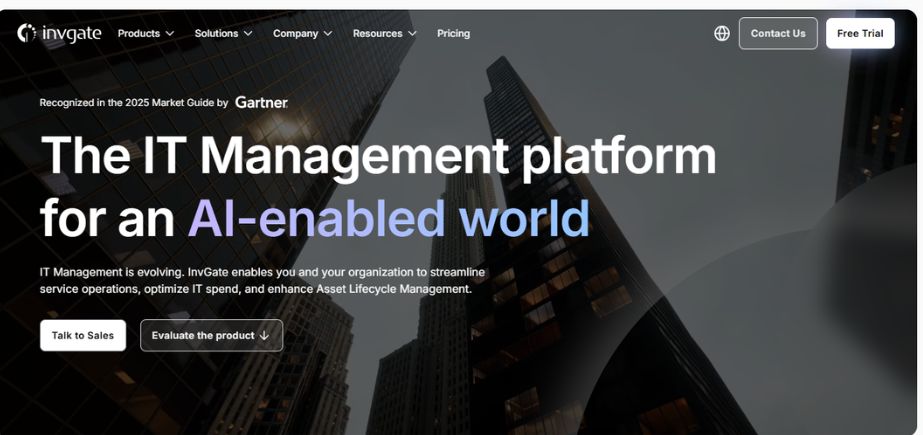
InvGate Service Management is an ITIL-ready service desk software with robust capabilities like incident management, SLA compliance, asset integration, and workflow customization. It has a drag-and-drop workflow builder, knowledge base features, and performance analytics. It has support for easy-to-use design that helps in quick onboarding, along with cloud-based and on-premise deployment. InvGate Service Management puts in strong efforts at usability and pricing without compromising enterprise-class functionality. It’s a useful solution for IT support organizations who want to automate support processes, monitor service levels, and provide a better experience to end-users.
Key Features:
- SLA tracking
- Reporting and analytics
- Workflow builder
- Knowledge management
Pros:
- Value for money
- Simple setup
Cons:
- Smaller integration library
- Limited customization
Pricing:
Starts at $15/agent/month
Who Should Use It?
Growing businesses looking for affordable ITSM.
15. HappyFox
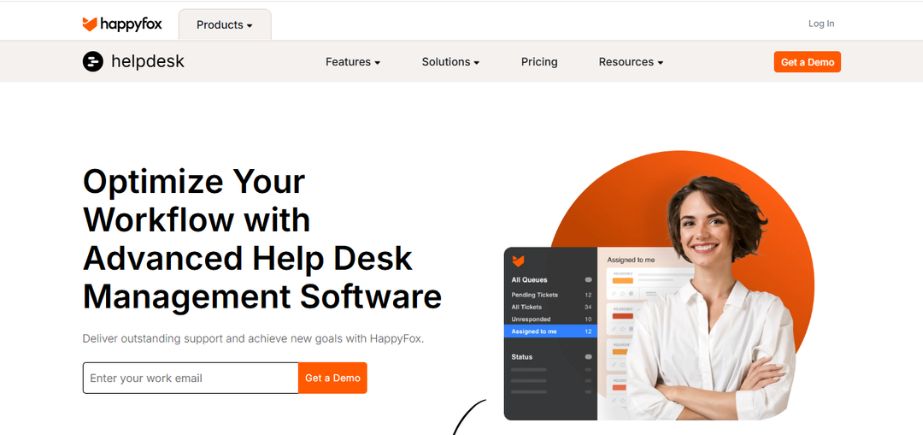
HappyFox is an adaptive and one of the best IT service desk tools providing automation, multi-channel ticketing, and a robust knowledge base. It facilitates support operations on the help desk across email, chat, phone, and social media channels to track tickets effectively and close them. Smart rules, workflow, canned answers, and sophisticated analytics are offered in the tool. Its dynamic interface allows organizations to customize activities as per the organizational requirements. HappyFox automates internal support operations and enables teams to manage increased ticket volumes with less staff. It also has responsive support and is user-friendly.
Key Features:
- SLA management
- AI-powered ticketing
- Reporting tools
- Mobile access
Pros:
- Strong automation
- Customizable workflows
Cons:
- Steeper pricing tiers
- Fewer native integrations
Pricing:
Starts at $39/agent/month
Who Should Use It?
Teams seeking automation and fast support.
Comparison Table
| Tool | Starting Price | Best For | Website |
| Freshservice | ₹1399/agent /month | SMBs, IT teams | freshworks.com/freshservice |
| ServiceNow | Custom quote | Enterprises | servicenow.com |
| Zendesk | $19/agent/month | Customer support, SMBs | zendesk.com |
| Jira Service Mgmt | $21/agent/month | Agile teams | atlassian.com/jira/service-mgmt |
| ManageEngine SDP | $10/tech/month | Budget-conscious IT teams | manageengine.com |
| SysAid | Custom quote | Mid-sized businesses | sysaid.com |
| BMC Helix | Custom quote | Enterprises with AI needs | bmc.com |
| Spiceworks | Free | Startups | spiceworks.com/help-desk |
| SolarWinds | $19/agent/month | Smart mid-size teams | solarwinds.com |
| Ivanti Neurons | Custom quote | Enterprises | ivanti.com |
| TOPdesk | Custom quote | Public sector, education | topdesk.com |
| Cherwell | Custom quote | Midsize to large businesses | cherwell.com |
| InvGate | $15/agent/month | Affordable ITSM | invgate.com |
| HappyFox | $39/agent/month | Fast-growing businesses | happyfox.com |
| HaloITSM | $29/agent/month | Full-suite ITSM | haloitsm.com |
Conclusion
Choosing an IT service desk software is based on the size, complexity, and support needs of your organization. For small and new companies, Spiceworks and Freshservice are excellent choices that offer user-friendly interfaces at low costs. High-capacity enterprises may utilize powerful platforms like ServiceNow, BMC Helix, or Ivanti Neurons. Existing Agile teams already running on Atlassian platforms will see Jira Service Management fit right in.
Products like HappyFox and HaloITSM balance features and prices for mid-size companies. Whether you prioritize automation, ITIL compliance, or ease of use, there is a tool that is built for every IT department. Evaluate your current pain points, required features, and growth potential to select the tool best suited for your service goals and growth.
FAQs
1. What are IT service desk tools?
It is a computer program that assists organizations in managing IT issues, requests, and problems through ticketing and automation software.
2. What is the difference between a help desk and a service desk?
A help desk is support-user focused, but a service desk that involves IT service management (ITSM) processes on a broader level.
3. Is there any free stable IT service desk tool?
Yes, the tools such as Spiceworks will be perfect for small teams but may lack features.
4. Will other software be integrated into these tools?
These tools are all integrable with software such as Slack, Microsoft 365, Google Workspace, and CRMs.
5. Which tool will be perfect for startups?
Startups will be perfect with Freshservice, Zendesk, and Spiceworks according to ease of use and price.
